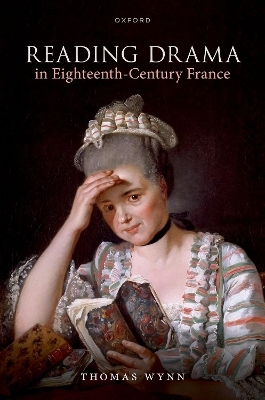
Reading Drama in Eighteenth-Century France
Seiten
2024
Oxford University Press (Verlag)
978-0-19-889532-9 (ISBN)
Oxford University Press (Verlag)
978-0-19-889532-9 (ISBN)
Thomas Wynn explores how plays were read in eighteenth-century France and, relatedly, the mode of closet drama: plays that were never performed within the playhouse. Drawing on queer theory, Wynn argues that eighteenth-century closet reading fostered disruptive pleasures that imparted another side to the period's 'théâtromanie'.
Reading Drama in Eighteenth-Century France is the first book-length study of how plays were read in eighteenth-century France and, relatedly, of closet drama: excessive plays that cannot be performed within the playhouse's confines and which thus appeal to the reader's imagination. This period in France was characterized by 'théâtromanie', a craze that encompassed the page as well as the stage. The book's first part surveys the historical context in which plays were read and offers a theoretical model for understanding this practice. The eighteenth-century closet was valued as a privileged site of reading. Although scholars routinely present this room as a place of calm reflection, Thomas Wynn develops a framework (derived in part from queer theory) to argue that it fosters passionate and disruptive pleasures that elude the coercive normativity of the playhouse. To explore the multipositional experience of reading plays in this period, Wynn turns to the journal Mercure de France, whose extensive reviews help us to think about geographies of reading, coercion, and autonomy.
The second part examines how dramatists exploited the critical, imaginative, and formal potential of the reading experience. It offers close analysis of several closet plays: comedies depicting the dispute between Jesuits and Jansenists in the 1730s; Hénault's historical drama François II, roi de France (1747); and erotic plays from the end of the period. The study concludes with an account of Rétif de La Bretonne's Le Drame de la vie (1793)--an extreme and arguably unsurpassed example of closet drama. Ultimately, this book shows, closet drama is not failed theatre but rather an indisputable part of the lively, passionate, and combative theatrical culture of eighteenth-century France.
Reading Drama in Eighteenth-Century France is the first book-length study of how plays were read in eighteenth-century France and, relatedly, of closet drama: excessive plays that cannot be performed within the playhouse's confines and which thus appeal to the reader's imagination. This period in France was characterized by 'théâtromanie', a craze that encompassed the page as well as the stage. The book's first part surveys the historical context in which plays were read and offers a theoretical model for understanding this practice. The eighteenth-century closet was valued as a privileged site of reading. Although scholars routinely present this room as a place of calm reflection, Thomas Wynn develops a framework (derived in part from queer theory) to argue that it fosters passionate and disruptive pleasures that elude the coercive normativity of the playhouse. To explore the multipositional experience of reading plays in this period, Wynn turns to the journal Mercure de France, whose extensive reviews help us to think about geographies of reading, coercion, and autonomy.
The second part examines how dramatists exploited the critical, imaginative, and formal potential of the reading experience. It offers close analysis of several closet plays: comedies depicting the dispute between Jesuits and Jansenists in the 1730s; Hénault's historical drama François II, roi de France (1747); and erotic plays from the end of the period. The study concludes with an account of Rétif de La Bretonne's Le Drame de la vie (1793)--an extreme and arguably unsurpassed example of closet drama. Ultimately, this book shows, closet drama is not failed theatre but rather an indisputable part of the lively, passionate, and combative theatrical culture of eighteenth-century France.
Thomas Wynn is Professor of French at Durham University. He gained his DPhil from the University of Oxford in 2004 and was lecturer in French at the University of Exeter from 2005 until 2010. He specializes in eighteenth-century French literature, with a particular focus on Voltaire, Sade, theatre, and libertine writings.
Introduction
Part 1: Ways of Reading
1: Chapter 1: Théâtromanie and Reading
2: The Enlightenment Closet
3: Closeted Reading
4: Reading the Mercure in the Closet
Part 2: Closet Drama
5: Religious Controversy
6: Historical Drama
7: Erotic Drama
Conclusion: In and Out of Restif de la Bretonne's Closet
Bibliography
Index
| Erscheinungsdatum | 08.02.2024 |
|---|---|
| Verlagsort | Oxford |
| Sprache | englisch |
| Maße | 160 x 240 mm |
| Gewicht | 586 g |
| Themenwelt | Geisteswissenschaften ► Sprach- / Literaturwissenschaft ► Anglistik / Amerikanistik |
| Geisteswissenschaften ► Sprach- / Literaturwissenschaft ► Literaturgeschichte | |
| Geisteswissenschaften ► Sprach- / Literaturwissenschaft ► Literaturwissenschaft | |
| ISBN-10 | 0-19-889532-1 / 0198895321 |
| ISBN-13 | 978-0-19-889532-9 / 9780198895329 |
| Zustand | Neuware |
| Haben Sie eine Frage zum Produkt? |
Mehr entdecken
aus dem Bereich
aus dem Bereich
Poetik eines sozialen Urteils
Buch | Hardcover (2023)
De Gruyter (Verlag)
CHF 83,90
Buch | Softcover (2024)
belleville (Verlag)
CHF 27,95


